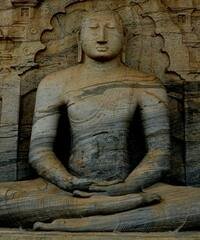The Aryan society was divided into four castes. While Brahmins and Kshatriyas occupied the top position in society, Shudras were considered outcasts. Mobility within the caste system was not allowed.
Many people considered the caste system oppressive. They were fascinated by Jainism and Buddhism which totally renounced the caste system and believed in the equality of all human beings.

Impact of Jainism and Buddhism
The Impact of Jainism and Buddhism is discussed below
Impact of Jainism
- Jains did not build any political empire of their own.
- It encouraged equality among the people as the Jains rejected the caste system and rituals.
- Important contributions were made in literature by the Jain monks. Jain literature included 12 upangas, 10 prakiranas, sutras and mulasutras. Purves contained the teachings of Mahavira. These texts are also important sources of the period from the 6th to the 4th century BC.
- Many monasteries and temples were constructed by the Jains. They had constructed many dharamshalas, homes for orphans and supported charitable organizations. The structures of the Bahubali at Shravanabelagola, Dilwara temples at Mt Abu and Jain Tower at Chittor are some fine specimens of Jain architecture.
Impact of Buddhism
- The doctrine of ahimsa or non-violence impacted the people and society deeply. Stress was given to animal protection.
- Buddhism challenged Hindu practices such as yajnas, sacrifices, and rituals. It outrightly rejected these practices and the caste system.
- Buddhists influenced emperors such as Ashoka and Chandragupta who later became non-violent. Thus, it affected Indian politics.
- As Buddhism spread to many parts of the world, such as China, Sri Lanka, and Southeast Asia, close cultural contacts emerged between these countries and India.
- Buddhism contributed immensely to language and literature. Many Buddhist texts were written during the period. Tripitakas-Vinaypitaka, Suttapitakas and Abhidhammapitaka were composed. The Vinaypitaka lays down rules for the Buddhist monks living in the sanghas. Suttapitakas contained various teachings of Lord Buddha and Abhidhammapitaka deals with Buddhist philosophy. The Jataka tales tell us about the life of Buddha.
- Stupas, chaityas, viharas, and rock-cut cave temples were constructed by the Buddhists. The stupas were semi-spherical dome-like structures that contained the relics of Buddha. The Stupas at Sanchi, Amravati, and Bharhut have survived till today.
- Chaityas were rectangular halls with semi-circular roofs supported by a number of columns.
You Asked, We Listened – All Subjects Study Materials
Also, Read
Finished Reading Impact of Jainism and Buddhism? We have more content for you…
Jainism and Buddhism

India in the sixth century BC saw the emergence of thinkers such as Zoroaster in Persia, Confucius in China and Mahavira and Gautam Buddha in India.
6 Main Causes for the Rise of Jainism and Buddhism
6 Main Causes for the Rise of Jainism and Buddhism are Reaction against Ritualism, Corruption in Religion, Rigid Caste System, Difficulty in Understanding Sanskrit
10 Causes Responsible for the decline of Jainism and Buddhism in India
The Main Causes Responsible for the decline of Jainism and Buddhism in India – spilt of Buddhism into the Mahayana and Hinayana.
Teachings of Jainism
Teachings of Jainism: Jainism rejected the authority of the Vedas. The Jains do not worship any God. Jainism preaches five vows. A Jain householder has to take the following five vows
Svetambara and Digambara
In about 300 BC, the first Jain council was held where differences among the Jains arose. As a result, Jains were divided into two groups: Svetambara and Digambara.
Impact of Buddhism on Art and Architecture

Impact of Buddhism on Art and Architecture: Buddhist viharas, temples, and monuments were known for their beautiful carvings. The gateways and railings of the Sanchi Stupa were covered with sculptured figures.
Life of Gautam Buddha

Life of Gautam Buddha: Buddha was born in 563 BC at Lumbini near Kapilavastu in Nepal. His father was the ruler of Kapilavastu. Buddha was inclined towards spiritual pursuits since his childhood.
Finished Reading Impact of Jainism and Buddhism?
You Asked, We Listened – All Subjects Study Materials